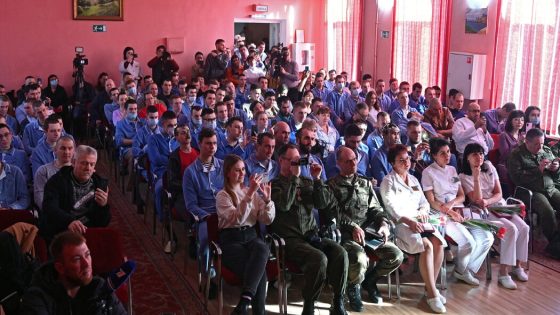A shell slammed into the ground just feet from where the Russian soldier was deployed, and the explosion tossed him into the air.
“I felt my arm fall off, then a blow to my leg, everything slowed down, just a frozen picture in my eyes — no sounds, no other sensations,” said the soldier, Andrei, a 29-year-old former convict recruited into the Wagner private military company.
Drifting in and out of consciousness, he was convinced that death loomed, he said in an interview, requesting that only his first name be used because of a fear of retribution by the Russian authorities. As shells exploded on all sides in the fighting near the Ukrainian city of Bakhmut, fellow soldiers dragged him to an evacuation point. He eventually spent more than a year in hospitals, with the remnants of his left arm amputated and one leg still at risk.
Cases like Andrei’s do not receive much publicity in Russia, where — as in Ukraine — the total number of war wounded is not disclosed. But, according to American and Ukrainian officials and numerous military analysts, the number is staggering, perhaps in the hundreds of thousands. And one senior Russian official estimated that amputees represented more than half of the seriously wounded.
Because reporters and aid groups have little or no access to hospitals or rehabilitation centers in Russia, information is scarce, often limited to community news reports and Telegram channels.
The Kremlin, military analysts and some medical personnel say, wants to avoid a repeat of the antiwar movements that forced a halt to earlier wars in Chechnya and Afghanistan.
“The Russian state has learned by experience that if it wants to maintain domestic stability, it should suppress that kind of debate,” said Nick Reynolds, a research fellow for land warfare at the Royal United Services Institute, a London-based military think tank.
Military analysts say the high number of wounded also reflects the striking indifference that Russia exhibits toward its soldiers as it sacrifices huge numbers to make small gains across the 600-mile front in Ukraine.
“The Russian leadership on every level does not care much about soldiers,” said Pavel Luzin, a Russia military expert with the Center for European Policy Analysis, a Washington-based research group.
Wounded veterans are not ignored entirely. They are occasionally featured on state television in the service of war propaganda — invariably presenting an upbeat account of how they are readily adapting to life with their injuries, including missing limbs.
On rare occasions, President Vladimir V. Putin visits the wounded in hospitals, pinning medals on their crisp, cobalt blue military pajamas. He sometimes acknowledges problems in the system, and he unfailingly promises solutions.
“As for prosthetics, there is still a lot to be done,” Mr. Putin said last month while talking to veterans. He had recently learned, he added, that former soldiers issued with prosthetics received reduced government payments, which he called “unacceptable.”
After the war’s first month, the Russian defense minister, Sergei K. Shoigu, announced 3,825 wounded, a figure Russia has never updated. So estimates of the wounded from both sides are extrapolated from the number of dead, which already involves significant guesswork.
William J. Burns, the director of the Central Intelligence Agency, wrote in an article published in Foreign Affairs last month that Russian dead and wounded soldiers numbered 315,000.
Numerous doctors, veterans or relatives, when contacted, declined to speak about the wounded, lest they breach Russia’s laws against revealing confidential information or denigrating the military, not to mention jeopardizing their jobs or benefits. Some who spoke declined to use their full names.
Multiple interviews indicated that the main aim in treating the wounded was to redeploy them to the battlefront quickly. There is a paucity of medical discharges, analysts and medical personnel said, underscoring the desperate need for soldiers, with the Ministry of Defense preferring to recycle the wounded rather than implementing another unpopular mobilization.
Dmitri, 35, was mobilized in September 2022. He said that his first horrific taste of the war came two months later, when a drone dropped a grenade on a nearby dugout holding 10 men. “There were arms ripped off, a helmet with brains on it, and one guy’s leg was torn off, although not completely torn off yet,” he recalled in an interview. “I was not ready for that. Nobody was.”
Last summer, Dmitri suffered shrapnel wounds from a drone strike that sent him to a hospital just inside Russia, he said. He counted about 400 patients in his ward, and 150 seriously wounded lying in another. With roughly 80 patients each, the doctors initially spent less than five minutes per soldier, he said: “It was a conveyor belt.”
Since Dmitri’s injuries were relatively light, nobody examined him for two days, then a doctor ran a magnet over his wounds. When it did not react, he received a splash of disinfectant and a few bandages before being discharged and told to report back to the front six days later.
“I was in shock” at the instructions, said Dmitri, who fled Russia with the help of the Georgia-based organization Go by the Forest.
Many of the accounts from doctors and the wounded suggest that Russia lacks essentials for treatment — everything from sufficient evacuation vehicles to hospital beds to drugs. The military runs a network of about 150 medical facilities nationwide, including a sophisticated medical academy in St. Petersburg and several specialized hospitals in Moscow.
The Russian Ministry of Defense did not respond to a request for comment.
Some veterans lauded what they called their fast, thorough care, but it could seem like winning the lottery. Artem Katulin, head of a training program for combat medicine, told the official RIA Novosti news agency last year that over half the war deaths were from injuries that were not life-threatening and that improperly tied tourniquets accounted for one-third of amputations.
Maxim Lukashevsky, a surgeon who volunteered at a hospital near the front and is now back working in Moscow, said in an interview that on a busy day he might treat around 45 wounded men in five hours, including up to five amputations.
A young Russian named Regina has published a diary on social media documenting the highs and lows of caring for her husband, Denis, hospitalized in St. Petersburg for more than a year with a chunk of his brain missing.
She has relied on crowd funding for everything from adult diapers to a high-tech wheelchair. While praising the dedication of the medical staff, she denounced the lack of individually tailored rehabilitation programs.
“I feel like I’m putting my loved one together like a puzzle,” she wrote. In another post, she noted, “I was so angry about how terrible everything was in terms of prescriptions for individual rehabilitation; I was just shaking with resentment.”
About 54 percent of wounded veterans classified as disabled have suffered amputations, Aleksei Vovchenko, the Russian deputy minister of labor and social protection, testified to a government committee in October, without giving an overall figure.
A traumatologist working in Siberia said that many permanently disabled young veterans had damaged organs or shattered joints. Although Russia builds prosthetic limbs, joint replacements are elusive because they were largely imported before the war, he and others said.
The traumatologist and others noted a distinct lack of public compassion for the grievously wounded. Amputees have begun to appear on the streets, begging for money, he said, and there are few facilities like wheelchair ramps.
Even Anton Filimonov, Russia’s poster boy for the upbeat amputee — he lost a leg by stepping on a land mine — said at a public forum in St. Petersburg last year that Russians were “not ready” to see amputees.
The stream of wounded will likely continue, military experts said. The losses have not prompted the armed forces “to change their fighting in this very attritional, infantry-led, frontal assault style,” said Karolina Hird, a Russia analyst with the Washington-based Institute for the Study of War.
Andrei, the Wagner recruit, was a construction worker from near Rostov who had served about three years of an eight-year sentence for severely wounding someone in a bar brawl. He trained for two weeks before being thrust onto the front lines, and was soon seriously injured.
With all the nerves and veins in his left arm destroyed, it was amputated. The doctors recommended that his heavily damaged left knee be replaced, but he was discharged last month in a wheelchair. He still endorses the war.
Originally left-handed, Andrei had to learn to depend on his right. Although a microprocessor moves the fingers on his prosthetic arm, it has a simple mechanical elbow, so he can hold a glass but cannot lift one to his lips.
“It is not a comfortable thing, to be honest,” he said.
Audio produced by Patricia Sulbarán.
Alina Lobzina, Oleg Matsnev and Helene Cooper contributed reporting.
Source Agencies



